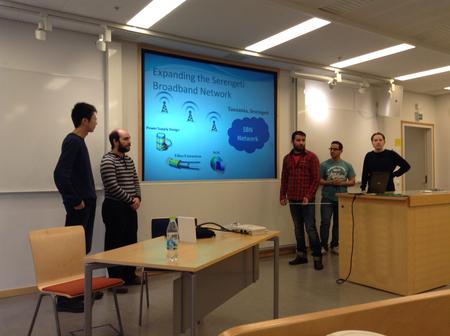2.4.3 Peer Learning and Peer Feedback
Students also learn from each other, a concept known as peer learning. Boud, Cohen and Sampson (20)define peer learning as a learning activity that is reciprocal and they state that “Peer learning should be mutually beneficial and involve the sharing of knowledge, ideas and experience between the participants”. They explicate the strengths of the method (20):
“Students learn a great deal by explaining their ideas to others and by participating in activities in which they can learn from their peers. They develop skills in organizing and planning learning activities, working collaboratively with others, giving and receiving feedback and evaluating their own learning.”
Peer learning can be informal and take place within the project teams, especially if the teams are mixed with students from different educational backgrounds. Peer learning can also be formal and more strictly planned and take place during lectures when students present different topics to each other. The fundamental idea with applying peer learning in a course setting, whether students are giving each other feedback, holding lectures, marking each other’s work or something similar, is the learning which is gained by “acting as the teacher”. By preparing a lecture, reading a team report, listening to a presentation and reflecting over critical aspects to raise, students can become much more aware of the contents, over different ways to communicate, over how important it is to be clear and precise when the teacher will do the marking and so on.
So, when students sometimes are disappointed with not having feedback or lectures only by the teacher, it can be very important to help them see that the main idea is for them to learn from the lectures and feedback that they give. The teacher’s or the supervisor’s role will be to provide feedback to the students who are acting as “teachers”.
An Example of Peer Learning from Integrated Product Development:
We offer lectures on a number of topics and, adjacent to some of the lectures, the teams are obliged to present aspects of their work to other students. For example, when organising a project is the subject, the teams read a book each on project organisation and then present the content to the other students. Sometimes we use peer learning instead of having lectures on a topic, e.g. the students present different creative methods to each other.
An Example on Peer Feedback from Communication Systems Design:
Halfway through the course, a peer feedback/peer review process is included in which the students give each other feedback on projects. The aim is to improve their work in the project, both in terms of process and product. The groups present their projects for about 20 minutes and then another group provides detailed feedback for about 10 minutes. Points raised are the project plan, work packages, division of labour in the group, time commitment, technical documents etc. To be able to give fruitful feedback, they have, in addition to reading all the documentation, also interviewed members of the other team. Further tothis there are teachers from the department attending the midterm workshop and they also have the opportunity to give feedback to the project teams.

Midterm workshop with peer feedback. Photo: Marie Magnell
An exampel from Future of Media: In this course, there is a session called “Midterm critics” where all project teams at an early stage of the project present their outline and ideas for their work. Each group presents for 10 minutes, and then there is another 10 minutes for feedback from the other students. Additionally, two teachers from the department and one representative from industry also give feedback.
Suggestion: Plan learning activities throughout the course in which students can learn from each other, in which students can act as “teachers”, i.e. give feedback, hold lectures and presentations.